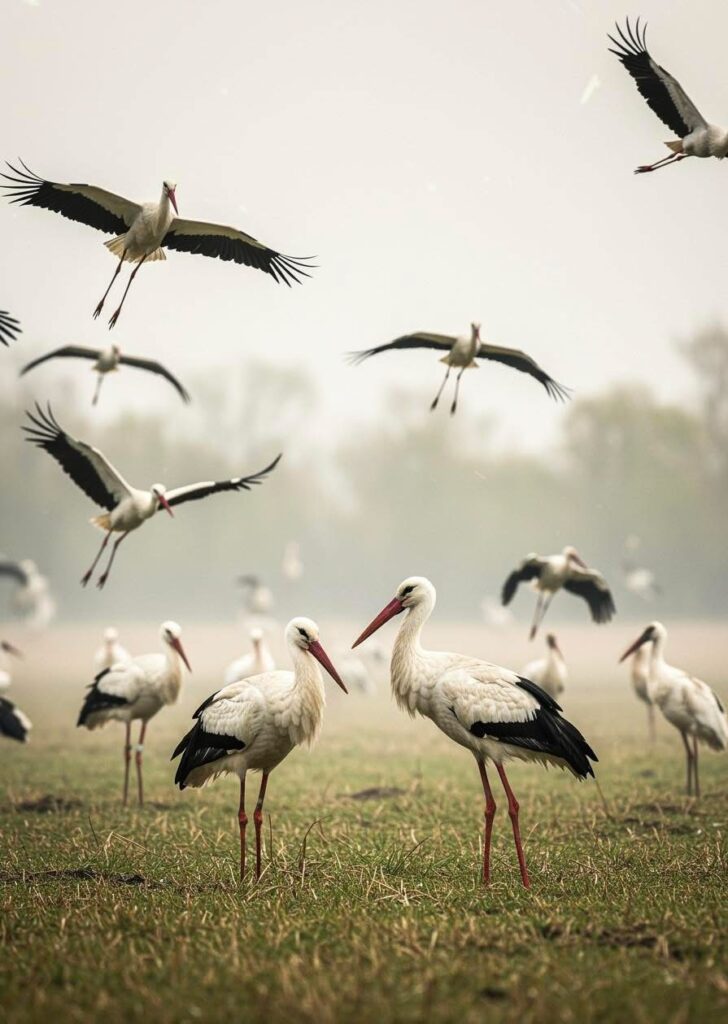As my Fulbright year comes to an end, I find myself saying goodbye not just to a place, but to a rhythm of life I havee grown into. Watching the storks rise into the August sky, I realize I am not just observing migration: I am living it.
The Sky Marks the Season
In late summer, a familiar ritual takes place across Romanian skies. Storks begin to gather on rooftops, electrical poles, and open fields, their long legs and curved necks silhouetted against the evening light. Then, almost in unison, they rise, catching the last warm currents of August air, and begin their long journey south.
The departure of the storks has always been more than a biological fact. It is a sign. For centuries, it has marked the end of summer, the turn toward harvest and reflection. Children wave to them. Elders nod knowingly. In village culture, this moment is both ordinary and sacred, a quiet goodbye to warmth, abundance, and presence.
This year, I find myself looking to the sky differently. I too am preparing to leave. My Fulbright research is complete. The notebooks are full. The recordings transcribed. My time in Romania, like the summer, is closing its circle.
The Migration Instinct
The storks will cross continents, flying over seas, deserts, cities, and borders to reach their winter grounds in Africa. Their path is dangerous, subject to shifting winds, storms, and the hazards of a world increasingly altered by human activity. And yet, year after year, they go.
There is something deeply moving about their persistence, about the way they trust the invisible map written into their bodies. As I prepare for my own return, I am struck by how many of the women I interviewed spoke of migration not just as a journey, but as a condition of survival. A pattern. A rhythm.
Whether it was seasonal labor in Western Europe, displacement after flooding, or the emotional migrations that come with caregiving and grief, the Danube Delta’s women know what it means to move between worlds. Like the storks, they often go because they must, and they carry home with them, even as they depart from it.
Leaving and Belonging
The bond between storks and Romanian villages is intimate. Their nests are part of the architecture. Their presence is woven into folk beliefs, symbols of good luck, fertility, and family continuity. When they leave, it feels personal.
In some ways, so does my departure.
Over this past year, I have come to feel a different kind of belonging, not just as a researcher, but as someone listening, witnessing, and slowly being folded into the rhythms of a place. Saying goodbye is not easy, especially when the ties are no longer only academic.
And yet, like the villagers who watch the storks disappear into the horizon, I know this is not an end. It is a return in motion.
The Promise of Reappearance
Spring will come again. In March, the storks will return, often to the exact same nest. Their arrival is a moment of joy. Children point and cheer. Farmers smile. Life resumes its rhythm.
This return is never taken for granted, even though it happens each year. It is a quiet kind of miracle, a reminder that what leaves can also return, transformed but familiar.
As I pack my bags and prepare to cross back over the Atlantic, I carry this promise with me. The Danube Delta has given me stories, friendships, and a deepened understanding of resilience. But it has also given me something simpler, older: the knowledge that migration is not absence, and departure is not the opposite of belonging.
Learning from the Storks
To watch the storks is to be reminded of patience, courage, and faith in return. Their flight is not frantic. It is measured. It follows the air, the seasons, the invisible call of a deeper logic. They do not resist change. They inhabit it.
Perhaps this is the true lesson: that we, too, can embrace the inevitable crossings in our lives without fear of losing ourselves. That to migrate is not to disappear. It is to move, to adapt, to grow, and, eventually, to come home.
Until Spring
Drum bun și să vă întoarceți cu bine. Safe travels, and may you return well.
To the storks, to the Danube Delta, to Romania, and to the chapters ahead: goodbye, for now.

